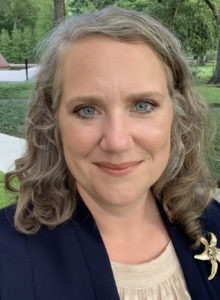In Texas, vehement castigations of Critical Race Theory are being thrown around when a last grasp at holding onto white supremacy is what was actually passed in the Legislature. This bill seeks to deny our hard truths, our painful history, the ongoing oppression.
But denying the painful truths of history only leads to repeating them. We all have the capacity to hear the stories, to believe people of color, to remember, and most importantly, knowing the truth of oppression, we can see what must change.

Laura Mayo
In Texas, buzz words like “sanctity of life” are being thrown around when control and power are the real goals. As Methodist Minister David Barnhart previously noted: “‘The unborn’ are a convenient group of people to advocate for. They never make demands of you; they are morally uncomplicated, unlike the incarcerated, addicted or the chronically poor; they don’t resent your condescension or complain that you are not politically correct; unlike widows, they don’t ask you to question patriarchy; unlike orphans, they don’t need money, education or child care; unlike aliens, they don’t bring all that racial, cultural and religious baggage that you dislike; they allow you to feel good about yourself without any work at creating or maintaining relationships; and when they are born, you can forget about them, because they cease to be unborn. You can love the unborn and advocate for them without substantially challenging your own wealth, power, or privilege, without re-imagining social structures, apologizing, or making reparations to anyone.”
In Texas, charges of voter fraud are being levied while there is no evidence that voter fraud is a problem; when the problem is a lie and the solution is disenfranchised voters, especially low-income voters and voters of color.
Buzz words like “my body, my choice” are being thrown around when it comes to masks and vaccines but completely ignored when it comes to the bodies of those of us who can become pregnant. There is a high level of hypocrisy when “pro-life” is applied to a fetus but gun violence is given free reign with a law that means guns are even more accessible, even though we know that in places where guns are more accessible gun violence is more prevalent. This is not about life; it is about power and control.
It is not “pro-life” to deny people health care; it is not honoring the sanctity of life to make it easier to get guns; it is not pro-life to refuse to wear a mask and refuse to get vaccinated; it is not honoring the sanctity of life to try to keep people from voting; it is not “pro-life” to ignore the living children who suffer from food insecurity and abuse; it is not honoring the sanctity of life to appropriate “my body, my choice” maliciously to try to equalize two distinct issues, collapsing the fundamental difference between a pandemic — a public health crisis — and a personal, private medical issue; it is not valuing the sanctity of life to deny the history of abuse and oppression of people of color in this country nor to reject the clear evidence that it is part of the very fabric of our current society.
“It is not ‘pro-life’ to deny people health care; it is not honoring the sanctity of life to make it easier to get guns.”
Last Sunday’s Gospel reading in the Lectionary was from Mark chapter 7, the story of Jesus interacting with the Syrophoenician woman whose daughter had an unclean spirit. This woman — we don’t know her name — is identified by her otherness. But she needs help. Jesus tries to ignore her. Nevertheless, she persists. Then he calls her names. Jesus’ bias gets in the way of his compassion. He appears to be doing what he accuses the religious leaders of doing: holding on to human precepts as doctrine and abandoning the commandment of God.
However, in this story, we see Jesus change his attitude because of a bold woman. This woman refuses to be ignored, she refuses to let insults have the last word, refuses to let religion get in the way of God, of openness, inclusion, hope and healing. Jesus is changed.
From this moment in his public ministry, Jesus’ vision of the way of God is expanded. Earlier, Jesus sent out the disciples with these words: “Go nowhere among the Gentiles, and enter no town of the Samaritans, but go rather to the lost sheep of the house of Israel.” After this encounter, he will send his disciples again with these instructions: “Go into all the world and proclaim the good news to the whole creation.”
Jesus’ vision is transformed and his welcome is expanded — all because of a woman who would not keep quiet, who kept persisting, who resisted the role and the limitations handed her.
If Jesus can change, can we? Jesus’ heart changes, his vision expands, he is confronted by a woman who won’t shut up, who won’t stay away, who persists and resists and counters his argument in a way that leads him to seeing, to empathy.
“Jesus’ heart changes, his vision expands, he is confronted by a woman who won’t shut up, who won’t stay away, who persists and resists and counters his argument in a way that leads him to seeing, to empathy.”
We, too, must refuse to give up, refuse to be ignored, refuse to believe the lies that are being passed off as the commandments of God. God is love. Love and justice and hope are neither passive nor silent.
A book group at our church has just finished reading and discussing Ibram X. Kendi’s How to be an Antiracist. In this book, Kendi moves the race discussion away from identity — “I am racist” or “I am not racist” — and toward action — “My actions are racist” or “My actions are anti-racist” — and thus shifts the conversation out of morality and into behavior.
The Syrophoenician woman invited Jesus out of his own racism with the faith, and perhaps desperation, that poured forth from her heart. It is as though she cries out: Can’t you see that God is bigger than any origin, any race, bigger than any bias, bigger than where you’re from or where I am from or what your religion says or what mine says? God is bigger — big enough to love all and every, big enough to help and heal and have compassion for all and every, big enough.
And Jesus’ heart is changed. His heart hears her heart, and he goes into action by healing the woman’s daughter.
What words from us do the legislators and governors need to hear? What will invite them to change, to have some basic human empathy? To be more intellectually honest? To enact policies that help the people?
“We will get it wrong. And when we do, we can change.”
What words do we need to hear? Sometimes we get it very wrong. No doubt our own biases, our racism, our heteronormative, patriarchal culture sometimes speaks from our hearts. And when it does, when ignoring, name-calling, misperceptions and lies show up, we must be brave enough to acknowledge them and to change. We will get it wrong. And when we do, we can change. We also sometimes will get it right and we will be ignored, called names, written off. When that happens, we must be like this courageous woman and persist, resist, find ways to evoke empathy.
What words do we need to say? What stories will evoke empathy? What words will lead to more compassion, to anti-racist policies, to actually valuing the living with health care and education, to caring for “the least of these”?
A determined woman-prophet showed Jesus the expansive love of God. We can follow her example. Change is possible. Even in Texas.
Laura Mayo serves as senior minister of Covenant Church in Houston. She is a graduate of Carson-Newman University and Wake Forest Divinity School, with additional studies at Regent’s Park College of Oxford University. She is active in various interfaith projects and organizations in Houston.
Related articles:
When your religion goes against mine | Opinion by David Bumgardner
God bless the USA but don’t mess with Texas: Reflections on America by a native Texan returning to Texas | Opinion by Laura Ellis


